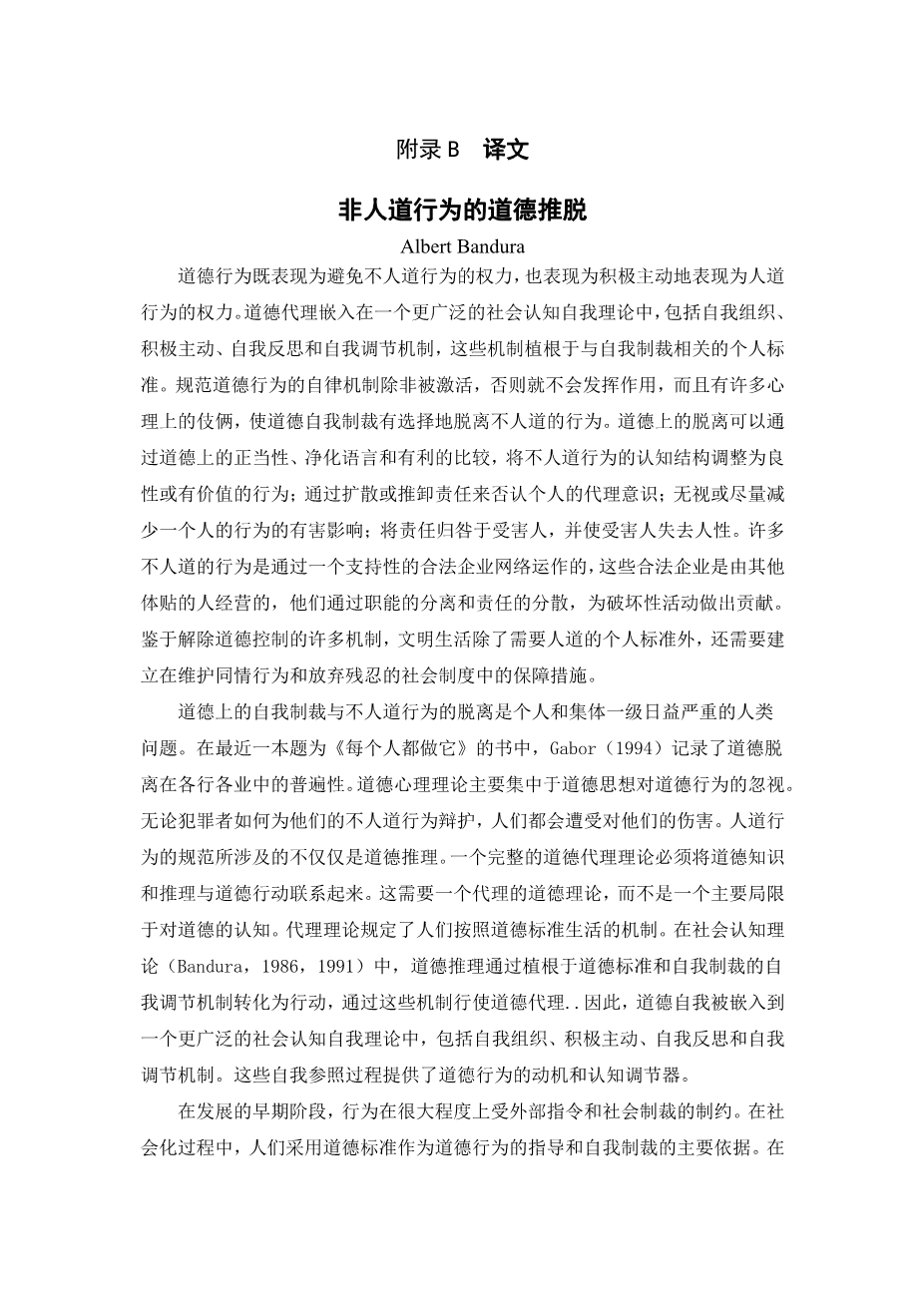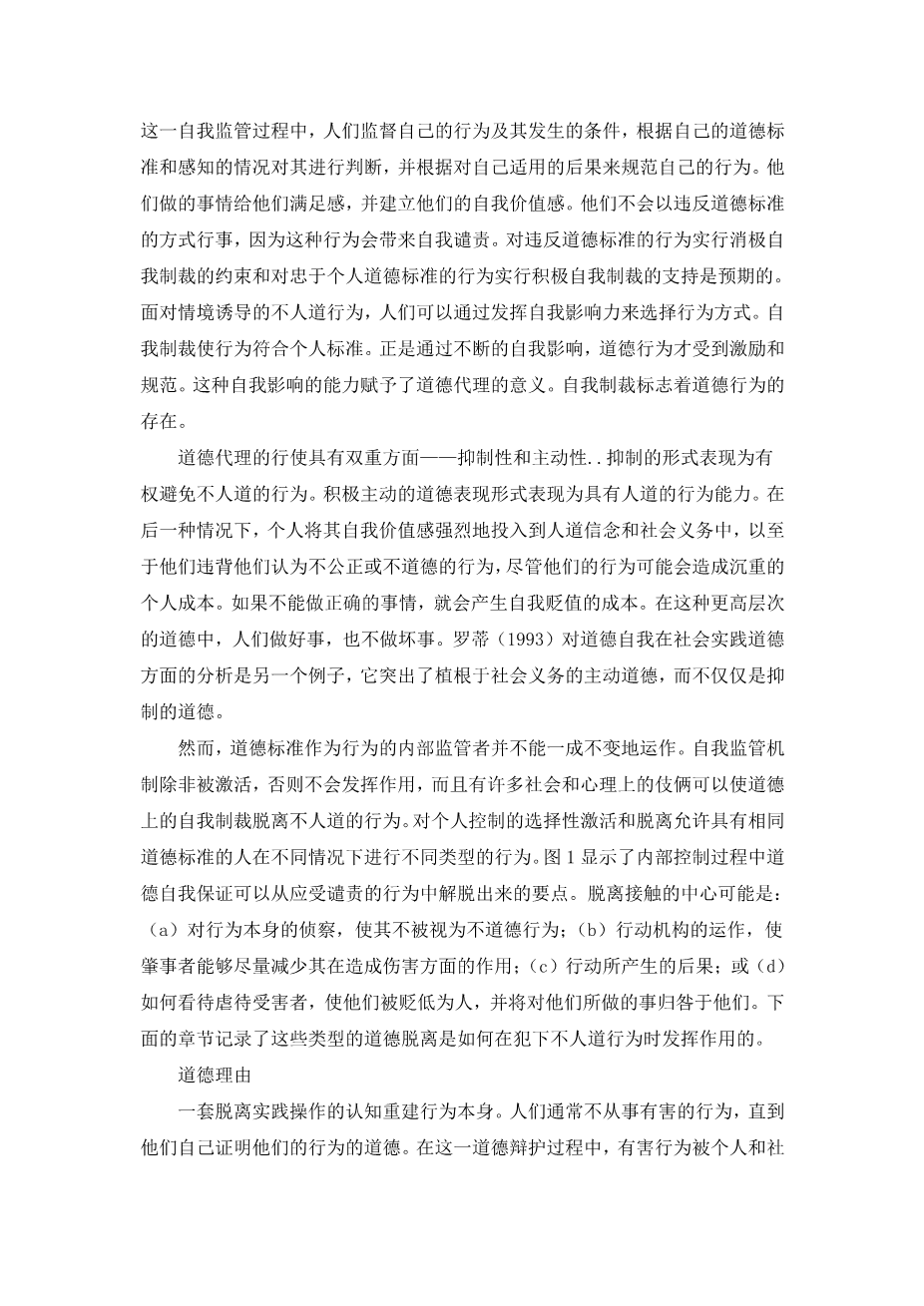工商Z1611 伍纯16200410103
Moral Disengagement in the Perpetration of Inhumanities
Albert Bandura
Department of Psychology
Stanford University
Moral agency is manifested in both the power to refrain from behaving inhumanely and the proactive power to behave humanely. Moral agency is embedded in a broader socio cognitive self -theory encompassing self-organizing, proactive, self-reflective, and self-regulatory mechanisms rooted in personal standards linked to self-sanctions. The self-regulatory mechanisms governing moral conduct do not come into play unless they are activated, and there are many psychosocial maneuvers by which moral self-sanctions are selectively disengaged from inhumane conduct. The moral disengagement may center on the cognitive restructuring of inhumane conduct into a benign or worthy one by moral justification, sanitizing language, and advantageous comparison; disavowal of a sense of personal agency by diffusion or displacement of responsibility; disregarding or minimizing the injurious effects of one s actions; and attribution of blame to, and de humanization of those who are victimized. Many inhumanities operate through a supportive network of legitimate enterprises run by otherwise considerate people who contribute to destructive activities by disconnected subdivision of functions and diffusion of responsibility. Given the many mechanisms for disengaging moral control, civilized life requires, in addition to humane personal standards, safeguards built into social systems that uphold compassionate behavior and renounce cruelty.
The disengagement of moral self-sanctions from inhumane conduct is a growing human problem at both individual and collective levels. In a recent book entitled Everybody Does It, Gabor (1994) documented the pervasiveness of moral disengagement in all walks of life. Psychological theories of morality focus heavily on moral thought to the neglect of moral conduct. People suffer from the wrongs done to them regardless of how perpetrators might justify their inhumane actions. The regulation of humane conduct involves much more than moral reasoning. A complete theory of moral agency must link moral knowledge and reasoning to moral action. This requires an agentic theory of morality rather than one confined mainly to cognitions about morality. An agentic theory specifies the mechanisms by which people come to live in accordance with moral standards. In social cognitive theory (Bandura, 1986, 1991), moral reasoning is translated into actions through self-regulatory mechanisms rooted in moral standards and self-sanctions by which moral agency is exercised. The moral self is thus embedded in a broader, socio cognitive self theory encompassing self-organizing, proactive, self-reflective, and self regulative mechanisms. These self-referent processes provide the motivational as well as the cognitive regulators of moral conduct.
In early phases of development, conduct is largely regulated by external dictates and social sanctions. In the course of socialization, people adopt moral standards that serve as guides and as major bases for self-sanctions regarding moral conduct. In this self-regulatory process, people monitor their conduct and the conditions under which it occurs, judge it in relation to their moral standards and perceived circumstances, and regulate their actions by the consequences they apply to themselves. They do things that give them satisfaction and build their sense of self-worth. They refrain from behaving in ways that violate their moral standards, because such conduct will bring self-condemnation. The constraint of negative self-sanctions for conduct that violates ones moral standards and the support of positive self-sanctions for conduct faithful to personal moral standards operate anticipatorily. In the face of situational inducements to behave in inhumane ways, people can choose to behave otherwise by exerting self-influence. Self-sanctions keep conduct in line with personal standards. It is through the ongoing exercise of self-influence that moral conduct is motivated and regulated. This capacity for self-influence gives meaning to moral agency. Self-sanctions mark the presence of moral oughts.
The exercise of moral agency has dual aspects-inhibitive and proactive. The inhibitive form is manifested in the power to refrain from behaving inhumanely. The proactive form of morality is expressed in the power to behave humanely. In the latter case, individuals invest their sense of self-worth so strongly in humane convictions and social obligations that they act against what they regard as unjust or immoral even though their actions may incur heavy personal costs. Failure to do what is right would incur self-devaluation costs. In this higher order morality, people do good things as well as refrain from doing bad things. Rortys (1993) analysis of the moral self in terms of a social-practice morality is another example of a theory that highlights proactive morality rooted in social obligation rather than just the morality of inhibition.
Moral standards do not operate invariantly as internal regulators of conduct, however. Self-regulatory mechanisms do not come into play unless they are activated, and there are many social and psychological maneuvers by which moral self-sanctions can be disengaged from inhumane conduct. Selective activation and disengagement of personal control permit different types of conduct by persons with the same moral standards under different circumstances. Figure 1 shows the points in the process of internal control at which moral self-censure can be disengaged from reprehensible conduct. The disengagement may center on (a) the reconstrual of the conduct itself so it is not viewed as immoral, (b) the operation of the agency of action so that the perpetrators can minimize their role in causing harm, (c) the consequences that flow from actions, or (d) how the v
剩余内容已隐藏,支付完成后下载完整资料


英语译文共 44 页,剩余内容已隐藏,支付完成后下载完整资料
资料编号:[418075],资料为PDF文档或Word文档,PDF文档可免费转换为Word


